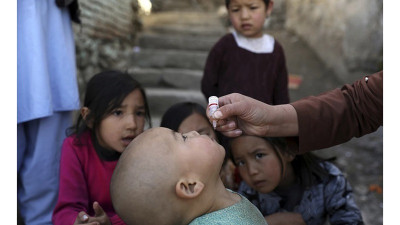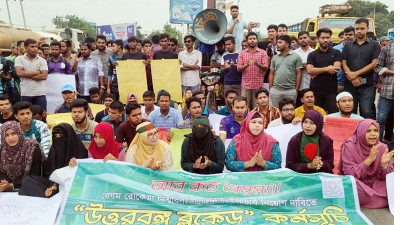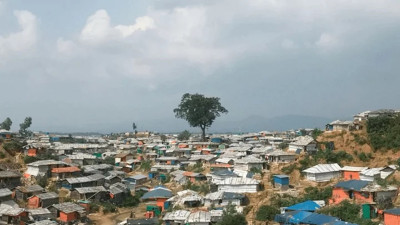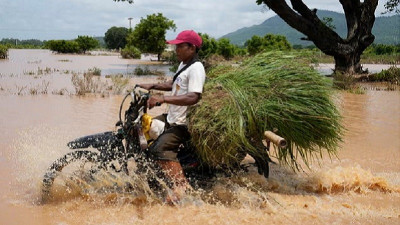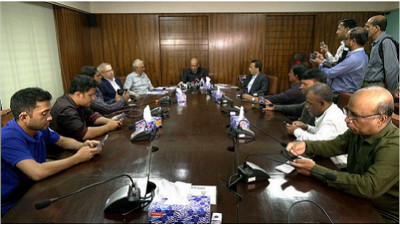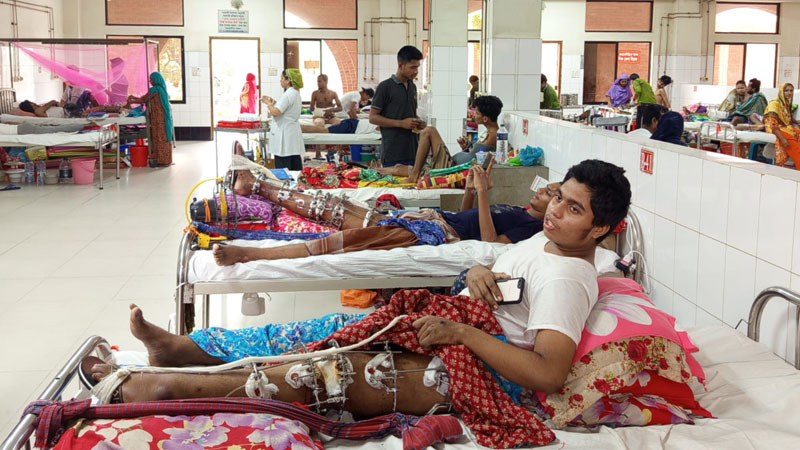 Photo: Bonik Barta
Photo: Bonik Barta Mehedi Alam worked at a flower shop in Gulshan, Dhaka. On
July 18, during the anti-discrimination movement, this young man was shot in
the Badda area. The bullet hit the upper part of his left ankle, causing a
four-inch area of flesh and bone to be torn away. Mehedi is still receiving
treatment at the National Institute of Traumatology and Orthopaedic
Rehabilitation (NITOR) in Agargaon, Dhaka. Over the past month and a half, he
has undergone surgery on his leg eight times. His family is now anxious and
uncertain about whether Mehedi's leg will be saved or need to be amputated.
Mehedi is not alone; several of the more than a hundred
patients currently being treated at this hospital are experiencing similar
anxiety. Some are dealing with severe injuries to their legs or arms. Almost
all the patients who have been treated or are still receiving care at the
hospital have been shot. The hospital authorities have reported that, so far,
21 patients have had to undergo amputations of their hands or legs to save
their lives.
Mehedi Alam is receiving treatment at the hospital in Bed
18 of Ward B. On Thursday afternoon, when we visited, he was sleeping. His
sister, Dalia, spoke with the reporter. She mentioned that Mehedi will need a
six-inch bone for his leg, which the doctors have said will need to be taken
from near the ankle. However, this is not yet confirmed. They are anxious and
unsure whether his leg will be saved or if an amputation will be necessary.
According to sources from the hospital director's office,
from July 17 to the period following the government's fall, a total of 769
people received emergency treatment due to violence surrounding the
anti-discrimination movement. Among them, 409 were shot. A total of 425 were
admitted to the hospital, and currently, 103 remain admitted. However, many
patients discharged from the hospital will need extended treatment.
Out of the 21 patients who underwent amputations, 17 had
their legs amputated, and 4 had their arms amputated. Seven of those who had
limbs amputated are still admitted to the hospital. Depending on the patient's
condition, it will take several months to complete their treatment.
Salman Hossain, a first-year student of Government Titumir
College, is receiving treatment in Bed 21 of Ward B at the hospital. He was
shot in his left leg on July 19. The bullet exited through his thigh, causing
the muscles in that area to fracture into eight pieces of bone. An orthopedic
implant (artificial metal plate for bone repair) has been placed in his leg. As
a result, his left leg is now over an inch shorter than his right leg.
Md. Tamim, an eighth-grade student from Durgapur High
School in Barisal, was shot on August 5 in Mirpur, Dhaka. He was visiting the
city as his professional mother lives there. The bullet severed the artery and
vein in his right leg and also caused a bone fracture. Although surgery was
performed at the National Institute of Cardiovascular Diseases (NICVD), the
artery and vein could not be repaired. Consequently, blood flow to the damaged
muscles stopped, increasing infection. To save his life, his right leg had to
be amputated above the knee on August 13.
Multiple orthopedic surgeons state that when limbs are
shot, blood vessels (arteries and veins) are often severed, and in many cases,
they cannot be reconnected later. If the vessels cannot be repaired, the tissue
begins to decay, leading to a risk of damage to vital organs, including the
kidneys.
Doctors explain that even after an amputation, the
patient is not out of danger. The wound is typically stitched several weeks
later, and many patients must stay in the hospital for extended periods. If
their condition improves, they are sent home with instructions to return in two
to three weeks. If bone and muscle infection persists, additional surgery may
be required. If everything is in order after the amputation, a prosthetic limb
can be fitted approximately three months later.
Several private and charitable organizations, including
BRAC, have contacted the hospital administration regarding prosthetic limbs.
The cost of fitting a prosthetic arm or leg ranges from BDT 3 lakh to 6 lakh.
The government or private development organizations provide the necessary funds
for these prosthetics.
Dr. Badiuzzaman, Deputy Director of NITOR, told Bonik
Barta, "Patients admitted to our hospital due to injuries from the
anti-discrimination movement, and those still here, are receiving treatment
free of charge from the government. So far, 21 patients have had to undergo
amputations of their hands or legs. Some of their conditions are critical. The
doctors are making every effort to save these patients' limbs, but for several
cases, we still cannot provide a definite prognosis."
Five patients have died while being treated at the
hospital. Doctors say that those who were shot or sustained injuries to their
limbs faced additional complications. Some experienced severe bleeding due to
severed or torn arteries and veins. Others developed cardiac issues or other
serious problems. Orthopaedic patients with such injuries do not face just one
type of problem; they go through various complications, and in some cases,
these complications can lead to death.
In August, the hospital's social service office at NITOR
reported that nearly BDT 5 million was spent on treating the injured from the
movement. Ms. Roushanara Khatun, a social service officer at NITOR, told Bonik
Barta, "Typically, financial assistance is provided to needy patients.
This involves withdrawing BDT 2.5 lakh monthly from the government fund through
the bank. Additional support is provided through various charitable
organizations as needed. The government and various donor organizations cover
the expenses for treating those injured in the anti-discrimination movement.
This funding is managed through the hospital's social service office. In
August, we spent BDT 4.1 million on their treatment."

